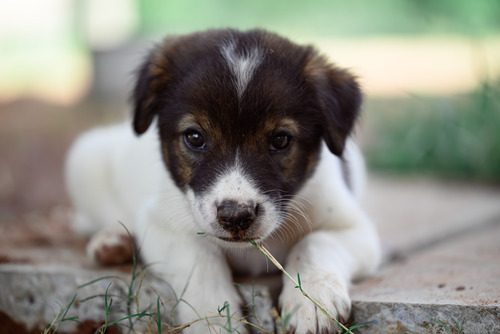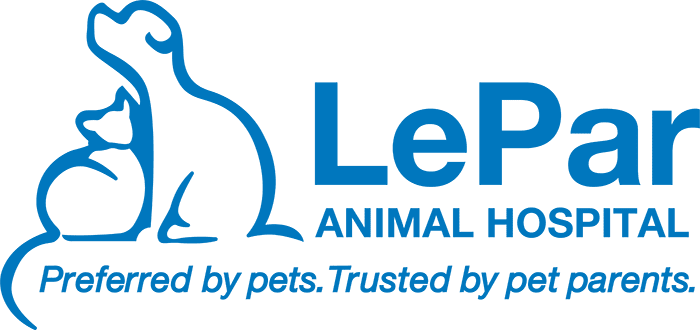Why is my Dog Eating Dirt?
It can be startling to catch your dog munching on a mouthful of dirt from the backyard or garden. While it might seem like a harmless or quirky behavior, eating dirt could be a sign that something more is going on with your dog’s health or environment. This behavior, known as pica when it involves eating non-food items, can point to anything from boredom and anxiety to dietary deficiencies or medical issues. If you’ve ever asked yourself, “Why is my dog eating dirt?” this blog is for you. Keep reading to learn what might cause this behavior, when it’s time to be concerned, and what your next steps should be.

Possible Reasons Why Your Dog Is Eating Dirt
Dogs may eat dirt for a variety of physical, behavioral, and environmental reasons. Identifying the underlying cause is the first step in understanding and managing the issue. Some dogs develop the habit as a result of curiosity or boredom, while others may be responding to discomfort or a nutritional imbalance.
Boredom or Lack of Enrichment
If your dog is spending long periods alone or isn’t getting enough physical or mental stimulation, they might turn to dirt as a form of entertainment. This type of behavior can be especially common in younger dogs or high-energy breeds. Digging, chewing, and even eating dirt can provide sensory feedback that feels rewarding, temporarily filling the gap caused by insufficient activity. In these cases, enhancing your dog’s environment with regular walks, interactive toys, and structured playtime may reduce their interest in soil.
Nutritional Deficiencies
In some cases, dogs eat dirt because their body is missing essential nutrients or minerals. This could be due to an imbalanced diet, a lack of proper supplementation, or difficulty absorbing nutrients due to a gastrointestinal issue. Dogs with deficiencies in iron or other minerals might instinctively attempt to “supplement” their diet by ingesting soil, which naturally contains trace elements. However, eating dirt is not a reliable or safe way to address dietary needs, and it may make the problem worse if harmful substances are ingested along with the soil.
Gastrointestinal Discomfort
Another potential answer to the question “Why is my dog eating dirt?” is an upset stomach or chronic gastrointestinal condition. Some dogs instinctively consume soil to try to soothe stomach discomfort. This behavior is occasionally seen in pets experiencing nausea, bloating, or inflammation. While eating dirt doesn’t provide actual relief, your dog might associate the behavior with feeling better temporarily, which can reinforce it over time.
Could Eating Dirt Be a Medical Concern?
While some cases are relatively harmless, eating dirt can sometimes point to underlying medical conditions that require veterinary attention. Understanding the medical side of this behavior can help you decide when to reach out for professional guidance.
Anemia or Other Blood-Related Issues
Anemia is one of the more well-documented medical causes of dirt eating in dogs. When a dog’s red blood cell count is low, their body may prompt behaviors that seek out iron or other nutrients. This could explain the urge to ingest soil or even clay-based substances. Anemia can result from blood loss, parasites, chronic disease, or nutritional imbalances, and it often requires veterinary diagnosis through bloodwork.
Parasitic Infections
Intestinal parasites, such as hookworms or roundworms, can lead to nutritional deficiencies or digestive upset that may trigger dirt-eating behavior. If your dog is eating dirt and also experiencing symptoms like diarrhea, weight loss, or a bloated abdomen, parasites could be the cause. These infections are common, especially in puppies and outdoor dogs, and they are typically easy to diagnose and treat with the help of your vet.
Liver or Kidney Issues
In more advanced cases, organ dysfunction, particularly involving the liver or kidneys, can cause changes in appetite and strange cravings. If your dog is eating dirt regularly and also showing signs like increased thirst, vomiting, lethargy, or changes in behavior, a medical evaluation is needed to rule out systemic disease.
Behavioral Causes for Dirt Eating in Dogs
Not all dirt-eating behavior is medically driven. In fact, some dogs develop this habit out of behavioral or emotional motivations. Recognizing and addressing these causes can often lead to a simple solution.
Anxiety or Stress
Dogs who are anxious may display various displacement behaviors like pacing, excessive licking, or chewing on inappropriate objects. Dirt eating can fall into this category. Stress-related eating habits might emerge during thunderstorms, after a big change in the household, or when the dog is left alone for long periods. These behaviors can become compulsive over time if the source of stress isn’t addressed.
Learned or Reinforced Behavior
Dogs are excellent at picking up on cause and effect. If eating dirt earns them extra attention whether positive or negative, they may continue to do it. In some cases, dogs who are scolded for digging might start eating the dirt to continue the interaction. Breaking this cycle often involves redirecting the behavior in a calm, consistent way, rather than punishing the dog.
Potential Risks of Dirt Eating
Even when the behavior seems minor, eating dirt isn’t without risks. Soil can contain harmful substances or organisms that can lead to illness.
Ingesting Toxins or Pesticides
Soil may contain fertilizer, weed killers, or other chemicals that are toxic to dogs. Even if your own yard is untreated, your dog might be exposed to residue from neighboring properties or public spaces. Ingesting small amounts of contaminated dirt can result in vomiting, drooling, or more severe poisoning symptoms.
Internal Injuries or Obstructions
Eating clumps of soil or rocks along with dirt can put your dog at risk of intestinal blockage or internal injuries. Sharp stones or dense material can damage the lining of the digestive tract. If your dog eats a large amount of dirt or shows signs of distress such as vomiting, bloating, or abdominal pain, they should be examined right away.
Exposure to Bacteria and Parasites
Soil is naturally full of bacteria and other microbes. While many of these are harmless, some like Clostridium or Giardia can lead to gastrointestinal infections. These infections often present with diarrhea, fatigue, or changes in appetite and require medical treatment.
How to Help Your Dog Stop Eating Dirt
Once you’ve identified the possible cause of your dog’s dirt eating, you can take steps to reduce or eliminate the behavior. Helping your dog break this habit typically involves a mix of behavioral modification, environmental changes, and support from your veterinary team.
- Offer Safe Alternatives: If your dog craves stimulation, consider puzzle feeders, chew toys, or food-dispensing games that engage their mind and mouth. Providing alternatives that satisfy the same sensory need can reduce the appeal of dirt.
- Improve Diet Quality: If a nutritional imbalance is suspected, ask your veterinarian to assess your dog’s current diet. You may be advised to switch to a more complete formula, add specific supplements, or explore prescription diets designed for dogs with absorption issues or chronic GI conditions.
- Rule Out Medical Causes: A physical exam, stool analysis, and basic lab work can reveal whether your dog’s behavior is tied to anemia, parasites, or other health concerns. You can call LePar Animal Hospital at (708) 423-3200 or book an appointment online to speak with our experienced veterinary team.
Red Flags That Mean You Should Contact Your Veterinarian
If your dog occasionally sniffs or mouths at soil, it may not require immediate concern. But if the behavior is frequent, intense, or accompanied by other symptoms such as weight loss, vomiting, or changes in appetite, it’s time to schedule a veterinary visit. Whether your dog is experiencing a dietary issue, stress, or a medical condition, the sooner you identify the reason, the easier it will be to manage. A professional evaluation at LePar Animal Hospital in Evergreen Park, IL, can help determine what’s driving this behavior and how to stop it safely. Our team is here to support your dog’s health with diagnostic insight, personalized care, and ongoing guidance so they can feel their best from the inside out. Call (708) 423-3200 or schedule an appointment online today.
Recent Posts
About Us
LePar Animal Hospital has served generations of pets and families in Evergreen Park, Oak Lawn, Palos, and neighboring suburbs, and we hope to serve generations more! Our animal hospital is accredited by the American Animal Hospital Association (AAHA) and staffed with Fear Free Certified veterinarians providing a multitude of services, from wellness and dental care to acupuncture, chemotherapy, and surgery.
